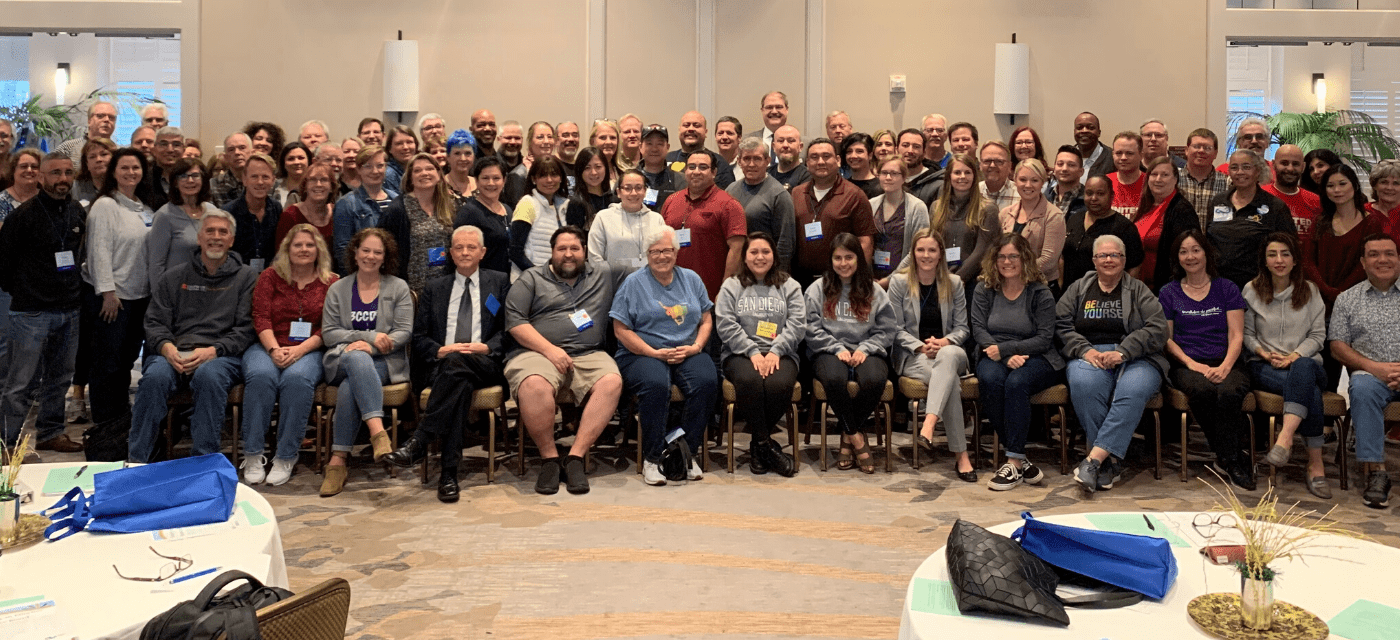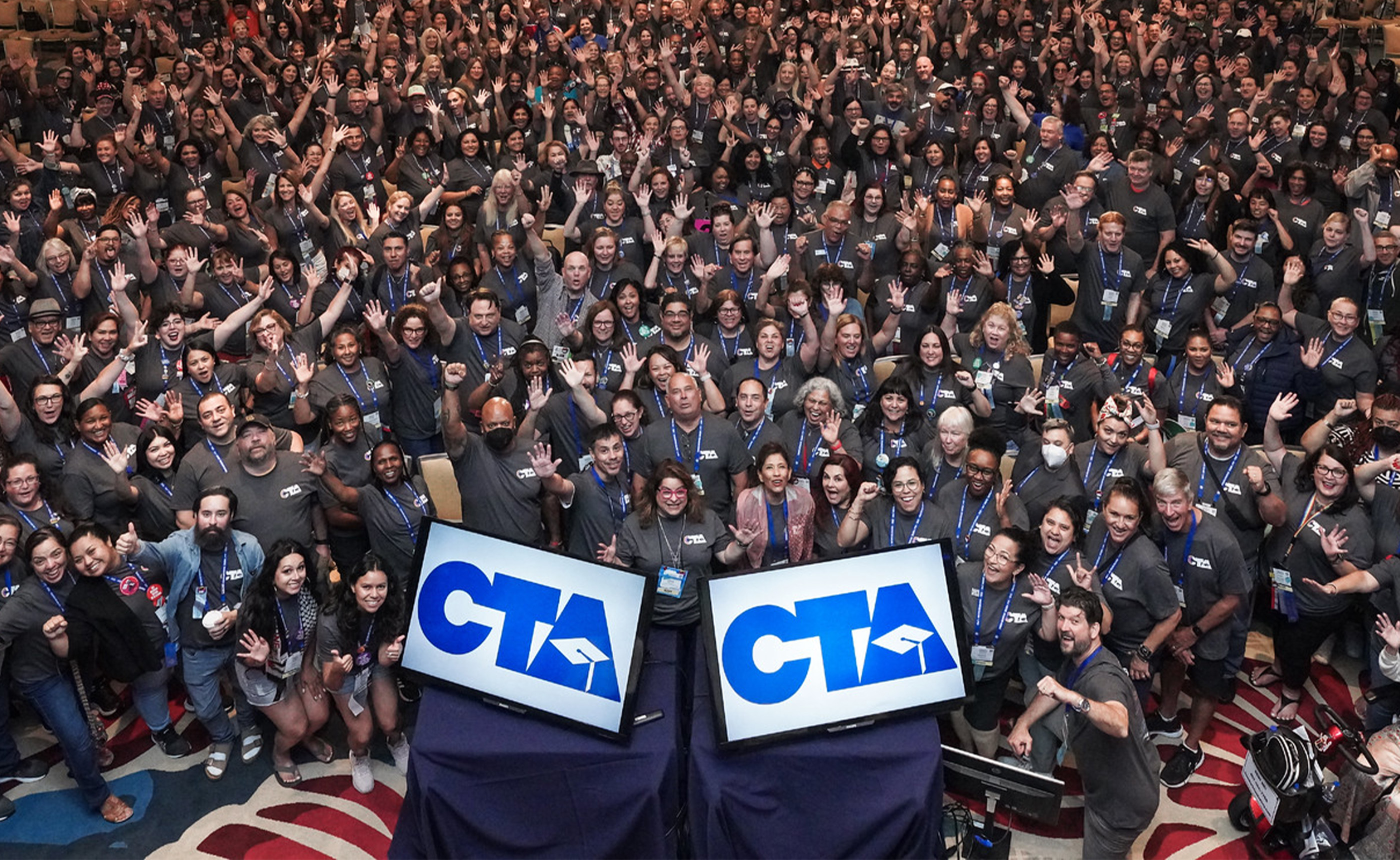Serving 73% of all Higher Ed Students in California
The Community College Association is a statewide affiliate of CTA, representing members working in 72 community college districts and 112 community colleges in California. CCA members reach 2.8 million students in the California community college system, and 73% of all students enrolled in California higher education.
CCA members provide leadership to achieve academic excellence, exclusive representation for collective bargaining and political action on behalf of community college faculty, students and programs.
CCA has become one of the most powerful voices for community colleges at the state level, striving to improve the working conditions of members and the quality of the community college system.
“The Community College Association, with CTA and NEA as our partners, advocates for faculty, empowers locals, builds strong and effective coalitions, and fights to preserve quality education.”
— CCA Mission Statement
Supporting and Advocating for Higher Education
CTA advocates for a multitude of higher education issues including admission requirements, financial aid, funding, student support services, matriculation and remediation, full and part-time faculty, tenured faculty and more.
CTA's Policy Brief on Higher Education
CTA believes the state’s community colleges, state colleges and universities should make admission decisions that are bias-free and take into account a student’s individual abilities and achievements. No student should be denied access because of funding shortages. Academic freedom must be assured.
College admission requirements should reflect the entire academic experience of a student and must be bias-free. Any standardized tests used in admission decisions must be valid and fair to all students regardless of economic, cultural, and/or linguistic differences.
CTA believes no qualified student should be denied access to higher education programs on economic grounds or because of inadequate state and federal funding.
CTA believes in open access to higher education in California and recognizes that some admitted students are not yet fully capable of doing college-level work. Students should receive counseling about needed remediation and provided adequate time to improve their skills. They must have access to for-credit remedial courses.
CTA believes part-time faculty should only be employed/utilized when an educational program requires specialized training or expertise not available among the full-time faculty and when the need does not justify more than half-time employment. CTA believes that under no circumstances should the number of full-time faculty fall below 75%. CTA deplores using part-time faculty as a way of reducing instructional spending, reducing full-time positions, or increasing district budgets.
CTA believes that part-time faculty should receive pro-rata pay and benefits and should participate in and be compensated for professional activities and faculty development programs. Part-time faculty should have paid office hours; office and storage space; health benefits; and computer and e-mail access. Institutions must extend due process and reassignment rights to part-time faculty.
CTA believes tenure helps protect academic freedom, maintains continuity in academic and vocational programs, and helps develop a faculty committed to the long-term success of their institutions.
CTA's Policy Brief on Community Colleges
CTA believes that community colleges should provide all students with access to a high quality, free postsecondary education taught primarily by full-time instructors with a part-time complement.
Postsecondary BA/BS programs do not fit the traditional mission of community colleges. Prior to creating or expanding BA/BA programs, a policy and fiscal evaluation needs to be considered. No Prop. 98 funds should be used for these programs.
California’s community colleges should offer “open enrollment” without fees or tuition for instruction. All students who meet California residency requirements should have free access.
Statute – rather than the governor’s annual budget proposal – should provide community colleges with adequate, stable and predictable funding that is adjusted for inflation. Community colleges should receive the same level of instructional funding for courses taught by full-time and part-time faculty.
Part-time faculty should be hired only when an educational program requires specialized training or expertise not available and when the need does not justify more than half-time employment. The percentage of full-time faculty must not fall below 75%. Part-time positions must not be used to reduce instructional spending or save funds. Part-time faculty should receive pro-rata pay and benefits and compensation for professional activities and faculty development. Part-time faculty must have paid office hours; office and storage space; health benefits; computer and e-mail access, and full due process/reassignment rights.
CTA believes community colleges must provide salaries, benefits and working conditions that will attract and retain quality faculty and staff.
Community colleges must increase the number of minority student transferring to four-year institutions. Colleges should actively and aggressively recruit students, beginning in their junior high and middle school years. A comprehensive approach should include assessment; counseling and placement, support services and retention; remediation; English as a second language; and other services including expanded financial aid and outreach.
Colleges should feature clear admission and graduation standards; available student counseling, tutorial and other support services; and a thoughtfully articulated curriculum to help students succeed. Students have the right to complete course work missed due to documented extended illness.
Tenure plays a vital role in maintaining academic freedom, continuity in academic and vocational programs, and a faculty committed to the institutions’ long-term success.
Student Debt Averages Nearly $30,000 Per Person
Everyone deserves a fair shot at higher education. College is increasingly unattainable for students and student debt exceeds an astonishing $1.2 trillion. Around 40 million people in the U.S. have student debt, averaging $29,400 per person.
CTA has heard from thousands of our members on how student loans impact their lives. CTA Member Benefits has tools and resources about partial or entire forgiveness of federal student loans for public school educators. Learn more about federal programs that can help with loan forgiveness and lowering monthly payments.
NEA offers more information and resources through their Degrees Not Debt initiative.
Part-Time/Adjunct Faculty Issues
As the driving force advocating for part-time faculty compensation, health insurance, and paid office hours, CCA is committed to achieving equity for all part-time faculty by advocating for:
- Seniority Rights & Job Security
- Pay Parity
- Health, Vision, & Dental Benefits
- Fair Hiring Practices
- Grievance Rights & Due Process
- Paid Preparation Time
- Paid Office Hours & Office Space
- Personal Leave Rights
Conferences
CCA offers three distinct conferences per year in the Fall, Winter and Spring.
The Fall Conference in October highlights membership accomplishments and keeping members engaged in the union, the Winter Conference in February focuses on collective bargaining, and the Spring Conference in April highlights advocacy.
Grants and Awards
CCA offers a variety of grants and awards to support and honor CCA members and local chapters.
- Membership Development Grants support membership-specific activities.
- “We Honor Ours” (WHO) Awards honors CCA local and state union leaders.
- Faculty Equity and Diversity Awards for outstanding service on behalf of community college faculty.
- GLBT Award, in honor of David Sanchez, CTA’s first openly gay president, recognizes faculty who have supported, promoted and educated our community college family regarding gay, lesbian, bisexual, and transgender (GLBT) issues.
- Ethnic Minority Award, in honor of Mary Ann Pacheco, a Hispanic professor at Rio Hondo College, is given to faculty who promote equal access and treatment for minorities on campus.
- Part-Time Faculty Award in honor of David Milroy, another longtime faculty activist, is awarded to faculty who have worked to improve working conditions for part-time faculty.
California Leadership Academy
The California Leadership Academy (CLA) is a learning community made up of local community college representatives. The goal of CLA is for participants to develop advanced leadership skills, gain knowledge of the history and importance of unions and learn more about important statewide organizations.
For more information, contact Bonita Lovell blovell@cta.org.
The CCA Advocate
The CCA Advocate is the official publication of CCA. Published four times a year, the Advocate provides member stories, news, advocacy, information about benefits and other faculty resources.
If you’re interested in receiving the Advocate, or learning more, e-mail Claudia Briggs, CBriggs@cta.org.
Stay Connected!
Connect with CCA on Facebook, Twitter and Instagram. #CCA4Us

